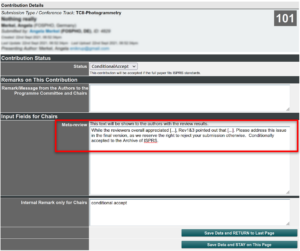Workflow
Technical Commission Presidents (TCP) assign every paper to a single AC. ACs review abstracts themselves, while full papers are reviewed by the chosen reviewers.
ACs are responsible for:
- fast-checking full papers,
- assigning reviewers,
- collecting reviews,
- writing the meta-reviews,
- making a preliminary decision, and
- checking the camera ready papers for conditionally accepted papers (see Camera-Ready Check).
The ACs do not review the full papers themselves: they make an informed decision based on the collected reviews, and their own opinion on the papers quality. In this decision making process, the AC officers can choose to ignore reviews of poor quality (e.g., missing motivation for negative assessments, sparse comments). They are asked to take position if reviewers expressed contradicting views. In this case, they can also ask for emergency reviews.
TCPs read the preliminary decisions issued by ACs and make the final decision. TCPs can involve another AC for resolving borderline cases if deemed necessary.
Initial Fast-Checks
Some authors may have selected the wrong Thematic Session or Technical Commission. Therefore, ACs and TCPs should check if the paper topic is in the expected scope. If not, they should signal the issue to their TCP who will reassign the paper to another commission, working group, or thematic session in concert with the Program Chairs (PCs).
ACs should also report to their TCP any conflict of interest, see below. TCP should be made aware of such conflicts as soon as possible, and the papers should be transferred to another PC/AC.
TCPs and ACs check whether full papers are anonymous. If not, they urgently ask the author to upload an anonymized version.
TCPs/ACs also checks whether the paper was edited based on the ISPRS template and it is readable (encoding, corrupted PDF). If the paper is not readable or incorrectly formatted (e.g. one-column format, wrong reference style, over-length), they should quickly ask the authors to upload a corrected version.
Reviewer assignment
We aim for 3 reviews per paper. This number cannot be guaranteed (due to missing reviews in particular). This number depends on the number and length of the submitted papers ACs assign reviewers to all their allocated papers. We suggest assigning at most 4 full papers to a single reviewer. Please remember many reviewers are shared among several topics and Technical Commissions. Conftool indicates the current number of assignments (1) per paper and (2) per reviewer.
Note that while the ACs do not review the full papers themselves, they are expected to give each allocated paper a cursory read and be aware of the nature of their content before assigning them to reviewers.
AC monitors the reviewing progress and timely invites additional reviewers if reviews are late or unavailable. If one or more submitted reviews are of low quality, ACs can also invite additional reviewers. ACs may review for another AC, but should make surer they can complete the reviews in time along with the work for their own WG.
Decision and Meta Reviews
Meta-review in conftool
The ACs collect and carefully read the reviews of their assigned full papers. ACs can ignore reviews of a poor quality, and must take position to resolve contradicting reviews. The reviewers are encouraged to specify if they think that a submission has flaws that should imperatively be fixed in the Camera Ready version. The reviewer will notify the ACs of such papers with the help of a “Major Revision Required” checkbox, and a dedicated text field. The ACs then write a short meta-review of a few sentences, summarizing the different reviews and, if applicable, highlighting the major issues pointed out by reviewers. The AC also chose a preliminary decision among four possible choices:
- Accept for Annals (limited to the best rated full papers),
- Accept for Archives (abstracts and other full papers),
- Conditional accept for borderline papers (abstract and full papers)
- Reject.
The meta-review of conditionally accepted full papers should state explicitly what changes must necessarily take place in the camera ready paper. Whether an accepted paper will be presented in a long oral, short oral or interactive session is decided later by the International Program Committee. However, AC and TCP are strongly encouraged to give their point of view in the dedicated internal comment (visible to the TCP only).
The meta reviews are visible by both the authors and the reviewers. Their objective is (i) to help the authors sort through possibly conflicting reviews and understand the main pointers for improving their work (ii) to show the reviewers that their comments were acknowledged and how they participated in the decision process.
Examples of Meta-Reviews:
- Accept: The reviewers appreciated the paper [strengths]. Please address the reviewers comments regarding [important or recurrent reviewers’ remarks] in the final version. Accepted to the [Annals/Archive] of ISPRS.
- Conditional Accept: While the reviewers overall appreciated [strengths], the reviewers pointed out [significant flaws]. Please address these issues in the final version, as we reserve the right to reject your submission otherwise. Conditionally accepted to the Archive of ISPRS.
- Reject: While the reviewers agreed that the work presented is interesting, they agreed that the paper is not yet ready for publication. The authors should in particular address [most serious weaknesses].
Authors are notified of the final decision regarding their paper by the Program Chairs.
Camera-Ready Check
The ACs control the camera ready version of papers that were conditionally accepted. The AC should check whether or not the mandatory changes have been enacted with seriousness and rigor. If it is not the case, the AC should quickly signal this issue with a short explanatory text to their TCP who will give a ruling regarding a potential late-rejection.
Conflicts of interest
To avoid any conflict of interest and to preserve the double blind review process of full papers, papers co-authored by Technical Commission Presidents and Vice Presidents are handled out of their TC. Similarly, ACs do not handle papers they co-authored.

